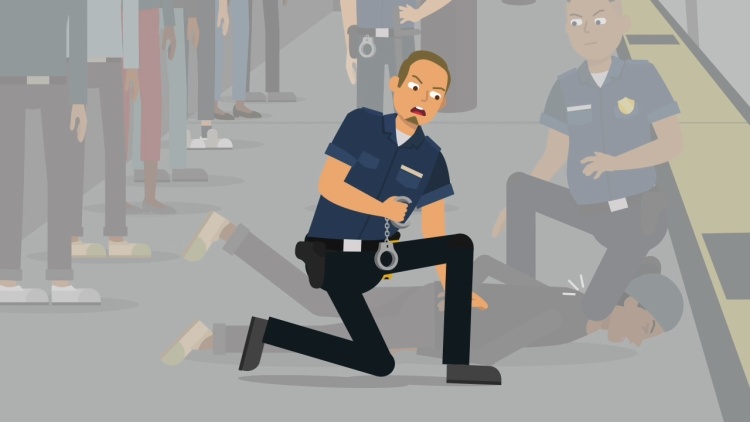People v. Mehserle
California Court of Appeal
206 Cal. App. 4th 1125, 142 Cal. Rptr. 3d 423 (2012)
- Written by Arlyn Katen, JD
Facts
At around 2:00 a.m. on New Year’s Day 2009, police officer Johannes Mehserle (defendant) reported to the Bay Area Rapid Transport station at Fruitvale after a fight erupted on a crowded train. First responder Officer Anthony Pirone hurled racial slurs at passengers, punched Oscar Grant, and otherwise physically and verbally abused passengers as he detained them on the platform. Shortly after Mehserle arrived, Mehserle pointed his taser at the detainees, including Grant. Pirone informed Mehserle that Grant would be going to jail for resisting arrest. Mehserle and Pirone put Grant on his front on the platform, and Pirone used his knees to pin Grant’s neck. Mehserle tried to handcuff Grant while Grant said, “I can’t breathe. I quit. I surrender.” Witnesses claimed that Mehserle said, “fuck this,” and told Pirone he would tase Grant. Mehserle’s handgun was very different from Mehserle’s taser: the handgun was holstered on the opposite side of his body; it was three times heavier; it had a more complicated holster-release system; and it lacked the taser’s red laser sight and on/off switch. Mehserle tugged three times at his handgun before successfully releasing it from the holster. Mehserle stood up and fired his gun into Grant’s back. Grant died at the hospital a few hours later. Mehserle appeared shocked after the shooting and initially claimed that he believed Grant was reaching for a gun. Grant was unarmed. At trial, Mehserle testified that he intended to tase Grant but accidentally drew his gun instead of his taser. The jury convicted Mehserle of involuntary manslaughter and acquitted Mehserle of murder and voluntary manslaughter. Mehserle was sentenced to two years in prison. Mehserle appealed, contending that there was insufficient evidence that he acted with the criminal negligence required to prove involuntary manslaughter.
Rule of Law
Issue
Holding and Reasoning (Marchiano, J.)
What to do next…
Here's why 911,000 law students have relied on our case briefs:
- Written by law professors and practitioners, not other law students. 47,100 briefs, keyed to 997 casebooks. Top-notch customer support.
- The right amount of information, includes the facts, issues, rule of law, holding and reasoning, and any concurrences and dissents.
- Access in your classes, works on your mobile and tablet. Massive library of related video lessons and high quality multiple-choice questions.
- Easy to use, uniform format for every case brief. Written in plain English, not in legalese. Our briefs summarize and simplify; they don’t just repeat the court’s language.







